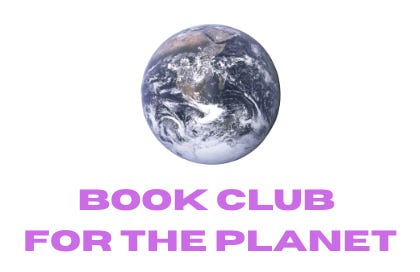Hi friends! I’m Jess and this is Book Club for the Planet, an online community for us to read about the climate crisis and solutions, together.
An issue as deep, all-encompassing, and dire as the climate crisis can be a lonely place to be when you’re reading and learning about it on your own. And it’s (unfortunately) not something we usually bring up in conversation, not even with our closest friends—it’s too big, too heavy, too hard. Just too much. Which is really just the biggest damn shame, because as we’re digesting some of the most complex and existential material of our lives, we don’t have a sounding board to process it all.
That’s what makes this group so remarkable. What a blessing to have so many smart, generous people to talk through climate with. To speak our revelations and feelings out loud and voice our questions to a group who’s open to talking about the big, heavy, hard stuff.
Thank you to all of you who showed up this week! As with our first book, I’d like to share the resources that our book club members shared in the Zoom comments field. More coming soon about our book picks for 2021…
Additional resources:
Patagonia Worn Wear recycles previously-worn gear, at a reduced cost, to reduce waste and consumption
Podcasts hosted by All We Can Save editors: How to Save a Planet and A Matter of Degrees
Janisse Ray, author of the essay, “The Seed Underground,” might be an interesting author for deeper reading for those looking to contribute to the communities they grew up in. She’s from a religious family in a small town in southern Georgia and her memoir, Ecology of a Cracker Childhood, was eye-opening for me.
Sierra Club’s Beyond Coal campaign
For those in a career transition, curious how they can dedicate more of their time and work towards the climate movement: this article from HEATED and this article from Grist
For organizers who are close to burnout or are responding to a negative organizing culture, I recommend Adrienne Maree Brown’s Pleasure Activism, “a politics of healing and happiness that explodes the dour myth that changing the world is just another form of work. Drawing on the black feminist tradition, she challenges us to rethink the ground rules of activism.”
From Michele on “systems thinking”:
I took a Systems Thinking class as part of my Environmental Studies degree in college. At the end of the semester, the joke among the seniors in the course was that we needed therapy after taking this class. We had learned that systems thinking meant that no solution was easy, especially climate solutions, because every little thing is tied to everything else. Our professor, who was also the head of the program, gave us the advice that the best thing we could do in our career and lives was focus on one thing that we were passionate about and could imagine dedicating our lives to. He told us not to get discouraged or distracted by the bigger picture, because if everyone focused on their one "small" passion, that is how real change could be made.
The book Braiding Sweetgrass by Robin Wall Kimmerer
Thank you to Elizabeth for voicing the value of anger. Additional reading: this article from The New Yorker and Good and Mad by Rebecca Traister
The book Drawdown: The Most Comprehensive Plan Ever Proposed to Reverse Global Warming, edited by Paul Hawken
The NPR “It’s Been a Minute” podcast episode, “Life in the Time of Coronavirus,” profiling stories of resilience and persistence, especially in older generations
The NYT “Daily” podcast episode, “The Social Life of Forests” on tree intelligence, about the Canadian ecologist Suzanne Simard



